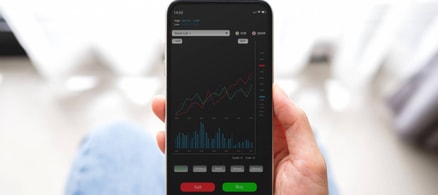1. The market is controlled by no one and no one thing
Many things make the market fluctuate. And no one knows when it's going to go up or down. The market takes you for a ride, and you never know when you're going to go around a curve or hit a long, straight patch.
It's important to pay attention to the news around the stock market, and it's important to pay attention to your portfolio. But don't think that you can control or time the market. Trying to predict what will happen with the stock market has been proven over and over again to be a fool's errand. So do yourself a favor and don't.
Meet Your Retirement Goals Effortlessly
The road to retirement may seem long, but with WiserAdvisor, you can find a trusted partner to guide you every step of the way
WiserAdvisor matches you with vetted financial advisors that offer personalized advice to help you to make the right choices, invest wisely, and secure the retirement you've always dreamed of. Start planning early, and get your retirement mapped out today.
Get Started2. Investing is a small act of faith
Investing is as much an act of faith as starting a business. You may have done your market research, know about the best products for you and looked at historical returns. But past performance doesn't determine future performance. As we said above, no one can predict the market. You invest and trust that your returns will grow to what you need them to be.
Of course, there are ways to mitigate the risks with investing. Diversify your accounts, adjust your holdings as you age and avoid high fees. These are all ways to hedge your bets in the market. So it's not like jumping off a cliff. but you do need to trust the system.
3. The earlier, the better
Ask any person who has made money in the markets, and they'll all say the same thing: The earlier you can start investing, the better off you'll be.
Investing is a long-term game. The more time you give yourself to play, the bigger the rewards you'll generally see. Compound interest (an interest that you earn based on your personal contributions and the interest you've already earned) is on your side as a young investor.
If you start investing at 18 and don't take any money out of the market until you're 65, you've had 47 years for interest to grow on your accounts. If you start investing at 28, you've got only 37 years. That's a whole decade of earnings you've lost out on!
Even starting small when you're younger is a huge advantage. $100 a month at 19 is a gift to your future self and shouldn't pinch your budget too much.
Stop overpaying for home insurance
Home insurance is an essential expense – one that can often be pricey. You can lower your monthly recurring expenses by finding a more economical alternative for home insurance.
SmartFinancial can help you do just that. SmartFinancial’s online marketplace of vetted home insurance providers allows you to quickly shop around for rates from the country’s top insurance companies, and ensure you’re paying the lowest price possible for your home insurance.
Explore better rates4. Know your investing “why”
Since investing is such a long-term game, it's essential to hold on to a long-term “why.” Why am I putting money here instead of spending it? Why am I saving for the future instead of splurging now?
To connect with your investing “why,” take some time to think about the course of your life. What do you want life to look like when you're 50? When you're 60 or 70? I bet you want comfort and security. That's why you're saving and investing today — for the comfort and security of your future self.
It helps to map out big-picture life goals and to know roughly when you'll want to achieve them. This map will keep you motivated with your investing and remind you what you're working toward.
5. Some funds have purchase minimums
I remembered saving up my first $1,000 to invest and, upon trying to purchase the index fund I wanted, being greeted with a purchase minimum of $3,000! I was so bummed because I had worked so hard to save that $1,000 and thought it was the beginning of my investing adventure.
Some funds within different brokerages have purchase minimums. Make sure you do your research on the index funds or mutual funds you want to purchase if you're going the passive investing route.
6. Different funds have different fees and management
Not all investments are created equal when it comes to paying for them. Some funds are fee-free (which is excellent!). Some come with management fees, activation fees and/or annual fees. It's super important that you understand what you're buying when you invest and that you know what kind of fees come with it.
You should also be crystal clear on what kind of management, if any, you get when you invest. Is this an actively managed account? How are they sending you updates and information about your account?
7. There's a difference between tax-advantaged and taxable accounts
You may have heard about the tax benefits of your retirement accounts. Do you know how investing through your 401(k) is different from buying shares of Facebook on the market?
There are different accounts that come with tax advantages. These include 401(k), 403(b), SEP IRA, traditional IRA and Roth IRA. You can contribute to your 401(k), for example, on a pre-tax basis, which means those contributions are exempt from federal tax.
However, taxable accounts are subject to all the taxes, all the time. If you open an Acorns account right now, let's say and use it to invest throughout the year, what you put into that account is subject to taxes.
8. You don't know what you don't know
When you first start to learn about investing, it can feel like there is so much information out there. And you're not wrong! There's a lot of investing terminology to familiarize yourself with.
Don't be afraid to ask questions and to read a lot of content from a lot of people. Everyone should ultimately determine their investing strategy but first comes the learning process.
9. Don't invest your emergency fund
Some people feel like they should invest all their savings since the market usually returns at a higher rate than most savings accounts. But you should never invest your emergency fund savings.
Your emergency fund is liquid savings you need access to right away when an emergency happens. Getting money out of the market can take a few days. Plus, while there could be weeks or even months when the value of your investments goes up, it will also go down. You don't want to lose money on your emergency fund in the market. It's better to keep that money in a high-interest bank account and invest only your long-term money.
10. Fees can compound just as easily as interest
While we are all for your interest compounding and you're earning more money, take note that fees can compound just as quickly! As we said above, it's critical that you know what kind of fees you're paying when you invest. Especially if those fees are on an annual basis, you could be investing $2,000 a year and paying $200 in fees each year. That's a 10% yearly fee rate that will eat into your earnings over the years.
11. You can and should make changes as life changes
The choices you make at 25 may not be the best choices for you at 45. The great thing about investing is that you can and should change how you invest over time. When you are young and have years of earning and investing ahead of you, your plan should look different from when you are five years away from retirement. Throw in some kids and a house, and maybe your investment strategy changes again. You make the choices that are right for you at the time and that are in alignment with your long-term goals.
Sponsored
Follow These Steps if you Want to Retire Early
Secure your financial future with a tailored plan to maximize investments, navigate taxes, and retire comfortably.
Zoe Financial is an online platform that can match you with a network of vetted fiduciary advisors who are evaluated based on their credentials, education, experience, and pricing. The best part? - there is no fee to find an advisor.










